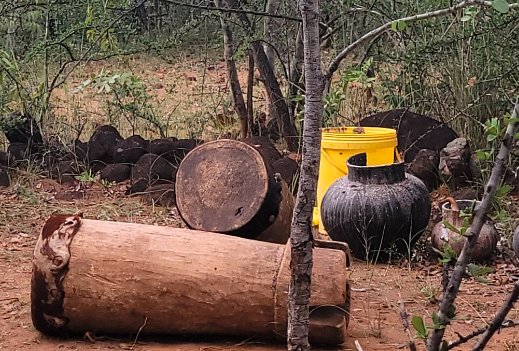By Network for Community Development (ncdzw.org)
Chipinge, Manicaland, October 31, 2025, Chipinge reigns supreme as anagricultural town, with vast fruit plantations including booming macadamia nut orchards that not only drive the national economy but also sustain hardworking families and bustling markets. This green engine of prosperity employs thousands, turning soil into wealth and feeding homes across the district and nation at large. Yet, amid this bounty, a quieter crisis unfolds, which is the the daily battles faced by people living with disabilities, who often toil in these fields or care for families without the support they deserve.
On October 9, a vital meeting at the Chipinge District Development Committee (DDC) Office boardroom gathered stakeholders to review the WEP Implementing Equalised Project. Facilitated by Mr. Chiraerae and Mr. Mwadira, and facilitated by Mr. Chadura from the Ministry of Health, the discussions exposed deep-rooted issues like stigma and limited reach. As a local voice through the Network for Community Development (NCD), focusing on orphans and vulnerable children, we have seen how disability amplifies poverty right here in Chipinge. Recent national data and budget insights sharpen this focus, revealing both progress and glaring shortfalls that policymakers must address to turn commitments into real change.
Zimbabwe’s 2022 Population and Housing Census offers a foundational snapshot, but layering in 2025 budget details shows where support falls short. These aren’t just digits, they represent neighbors, schoolchildren, and farmers we know. As NCD, our work with vulnerable groups underscores disability’s tight grip on families, especially kids. Let’s break down the figures and fiscal realities.
The National and Provincial Snapshot: A Rising Burden Amid Modest Gains
Across Zimbabwe, disability touches more lives than headlines suggest. For those aged five and above totalling 13,102,643 people—206,447, or 1.6 percent, live with disabilities, defined by challenges in seeing, hearing, walking, understanding, or self-care (Zimbabwe National Statistics Agency [ZIMSTAT], 2022). This rate climbs in rural areas to 2.0 percent, versus 0.9 percent urban, reflecting gaps in healthcare and infrastructure. Women and girls face a steeper climb, with 1.7 percent prevalence compared to 1.4 percent for men and boys, a disparity that grows with age due to lifelong strains like caregiving and labor (ZIMSTAT, 2022).
Age tells a story of escalation: Rates start low at 0.5 percent for ages 5-9 and 0.6 percent for 10-14, holding below 1 percent through the 20s and early 30s (ZIMSTAT, 2022). By 40-44, it’s 1.2 percent; 50-54 sees 2.3 percent; and it surges to 3.1 percent at 55-59, 4.3 percent at 60-64, and a stark 12.8 percent for those 65 and older (ZIMSTAT, 2022). For seniors, women hit 14.2 percent versus 10.7 percent for men, underscoring vulnerabilities in later life.
In Manicaland, our province of over 2 million residents, the picture darkens slightly to 1.7 percent prevalence which is above the national average (ZIMSTAT, 2022). That’s roughly 34,000 people navigating barriers daily. Women again lead at 1.8 percent, men at 1.5 percent. Age patterns mirror the country: Under 1 percent for youth up to 39, then rising to 3.1 percent by 55-59 and over 12 percent for 65-plus (ZIMSTAT, 2022). Districts like Buhera (2.7 percent) and Makoni (2.1 percent) show rural risks amplified by economic demands and disasters. For NCD, this hits home, many orphans are kids with disabilities or those caring for disabled parents, caught in poverty’s cycle.
The 2025 National Budget signals intent, allocating ZiG267 million specifically for “Support to Disabled” programs under the Ministry of Public Service, Labour and Social Welfare—a jump from ZiG14.8 million in early 2024 (Ministry of Finance, Economic Development and Investment Promotion [MFEIDIP], 2024). This funds assistive devices, capacity building, and empowerment loans for groups of people living with disabilities (PLWD). Broader social protection gets ZiG10,710.5 million to aid vulnerable groups, including PLWD, through cash transfers and livelihoods (MFEIDIP, 2024). Health assistance rings in at ZiG593 million for free care targeting 30,000 PLWD and elderly, covering chronic illnesses and mobile clinics (MFEIDIP, 2024). Yet, advocates note these figures, while welcome, remain a fraction of needscalls from disability groups in October urged a “disability-friendly” 2026 budget with deeper cuts for inclusion (Chiriseri, as cited in NewZiana, 2024).
Chipinge’s Overlooked Reality: Stats and Scattered Supports That Fall Short
Here in Chipinge, our district’s agricultural might masks a hidden toll. In Chipinge Rural, with 375,259 residents, disability affects 1.6 percent of those five and upabout 6,000 people (ZIMSTAT, 2022). Women face 0.9 percent prevalence, men 0.7 percent. In Chipinge Urban’s 34,959 people, it’s lower at 0.9 percent overallwomen 0.5 percent, men 0.4 percentbut urban poverty still bites hard, around 315 individuals (ZIMSTAT, 2022).
Youth data alarms most. For rural 5-14-year-olds, rates are 0.5-0.6%, sidelining over 1,000 children from education and play (ZIMSTAT, 2022). By 50-plus, it’s 2-3%; seniors reach 10-14 percent, isolating up to 800 elders without aid. Mental health issues, frequently ignored, compound this. The DDC meeting stressed how “mentally disturbed” individuals suffer double exclusion, with scant targeted help.
These figures echo what we witness daily in Chipinge. At markets, women with hearing challenges face misunderstandings from vendors. The WEP Equalised Project, spotlighted in that October 9 session, supplies devices like wheelchairs for health access. Yet, as Mr. Chadura pointed out, it’s confined to few wards, abandoning most of our 6,000. Stigma thrives with cultural views linking disability to “curses” delay kids’ treatment, favoring healers over clinics. We’ve watched families lose vital time this way.
Ministry supports trickle in but expose gaps. The Ministry of Health’s Chipinge office channels national health aid for PLWD, including free treatments under the ZiG593 million pot, but local clinics report shortages in mental health specialists (MFEIDIP, 2024). The Ministry of Local Government, via Chipinge Rural District Council, has a Special Advisor on Disability Issues coordinating with disabled people’s organizations for policy input, yet implementation lags, as seen in uneven disaster inclusion (Chipinge Rural District Council, n.d.). Spotlight Initiative, backed by UN and EU, has empowered women PLWD here with financial training since 2022, but it’s donor-driven, not scaled nationally (United Nations Spotlight Initiative, 2022).
Education tells a tougher story.
The Ministry of Primary and Secondary Education’s 2025 allocation of ZiG7 billion aims to boost inclusive access, including for disabled students (Parliament of Zimbabwe, 2025). In Chipinge, special classes exist but are woefully inadequate: Chipinge Primary School runs a small deaf unit, serving a handful of hearing-impaired kids with basic sign language instruction. Nearby, Big Tree Primary in Chief Musikavanhu area added a special needs section in 2014 for mild disabilities, offering therapy and adapted learning (The Herald, 2015). No dedicated schools for the blind or severe cases exist locally—kids must travel to Mutare’s Nzeve Deaf Centre or Harare’s King George VI for boarding rehab (Nzeve Deaf Centre, n.d.). With over 1,000 affected youth, these spots cover maybe 5 percent, leaving most in mainstream classes without ramps, braille, or trained aides. Policymakers: Is this equity? Our fields thrive on inclusion, why not our classrooms?
Hurdles and NCD’s Targeted Calls to Action
Barriers run deep as service providers’ attitudes like impatience and stereotypesbar entry despite open doors. Community sidelining from events and decisions fosters loneliness. Economic gaps lack micro-finance or job ties for PLWD. Monitoring falters without solid records, blinding us to progress.Still, the DDC meeting gathering sparked hope. Widen WEP district-wide, weave in mental health, foster local control. Triumph rests on attitude shifts with citizens argued to “step into PLWD shoes”.
Through NCD’s OVC lens, we connect disability to vulnerability. We’ve uncovered hidden cases via outreach, tied caregivers to income sources, and audited schools for inclusion. But partnership is key. Our recommendations target ministries’ Chipinge offices, urging budget boosts to close gaps:
- Ministry of Health (Chipinge District Hospital): Mandate disability training for staff, emphasizing mental health basics. Budget for 200 annual assistive devices in rural wards, drawing from the ZiG593 million health pool. Team with local stakeholders for child PLWD case management, hitting 80 percent psychosocial coverage by 2026.
- Ministry of Primary and Secondary Education (Chipinge DEO).Advocate for budget allocations to fund expansions of PLWD facilities in the district. Increase deaf and blind student classes across the district. Also Upgrade Chipinge Primary’s deaf classes with modern technonlogies and build a blind resource center at Big Tree. Inspect all 150+ schools for ramps, tools, and inclusive teaching. Target 100 percent PLWD child enrollment by 2026.
- Ministry of Local Government and Public Works (Chipinge DDC) Via the Special Advisor, seat PLWD in ward committees and disaster strategies to ensure that PLWD are not left behind. There is need to establish livelihood centers offering training and loans, aiding PLWD.
- Department of Social Welfare (Chipinge Office) Engage is campaigns via local radio stations such as Diamond Fm, and Wemuganga community radio reaching 50,000 listeners via radio to dismantle harmful beliefs about disability.
- Network for community development NCD As a local PVO (25/11) we will continue to pursue and drive classroom and community anti-stigma peer programs.
These are actionable plans, rooted in the meeting’s blueprint and budget realities. In Chipinge, equality is justice, not handout. Our 6,000 deserve dignity over neglect. NCD stands ready spotting cases, school advocacy, family disaster prep. To government Ministries, your local arms can unlock change. Let’s make data and dollars drive deeds, one inclusive step forwardfor the kids in our fields, the elders in our homes, and a district that leads in more than crops. As NCD we stand ready to compliment government efforts to ensure that PLWD are not left behind in line with the government mantra, “leaving no place and no one behind”
Network for Community Development, Building Bridges Breaking Barriers
References
Chipinge Rural District Council. (n.d.). *Special advisor on disability issues*. https://www.chipingerdc.gov.zw/special-advisor-on-disability-issues/
Ministry of Finance, Economic Development and Investment Promotion. (2024). The 2025 national budget statement. https://zimtreasury.co.zw/wp-content/uploads/2024/11/2025-National-Budget-Statement-FINAL.pdf
NewZiana. (2024, October 7). Persons with disabilities expect an inclusive 2025 national budget. https://newziana.co.zw/persons-with-disabilities-expect-an-inclusive-2025-national-budget/
Nzeve Deaf Centre. (n.d.). About us. https://nzeve.org.zw/about/
Parliament of Zimbabwe. (2025, July 31). National assembly votes 31 July 2025 Vol. 51 No. 72. https://www.parlzim.gov.zw/download/national-assembly-votes-31-july-2025-vol-51-no-72/
The Herald. (2015, October 16). Inclusivity in education: Big Tree Primary School takes lead. https://www.heraldonline.co.zw/manicapost/inclusivity-in-education-big-tree-primary-school-takes-lead/
United Nations Spotlight Initiative. (2022, June 22). Leave no one behind: Spotlight Initiative a boon to women with disabilities. https://zimbabwe.un.org/en/187217-leave-no-one-behind-spotlight-initiative-boon-women-disabilitiesZimbabwe National Statistics Agency. (2022). 2022 population and housing census: Disability thematic report. https://www.zimstat.co.zw/wp-content/uploads/Census/Disability_Report.pdf













